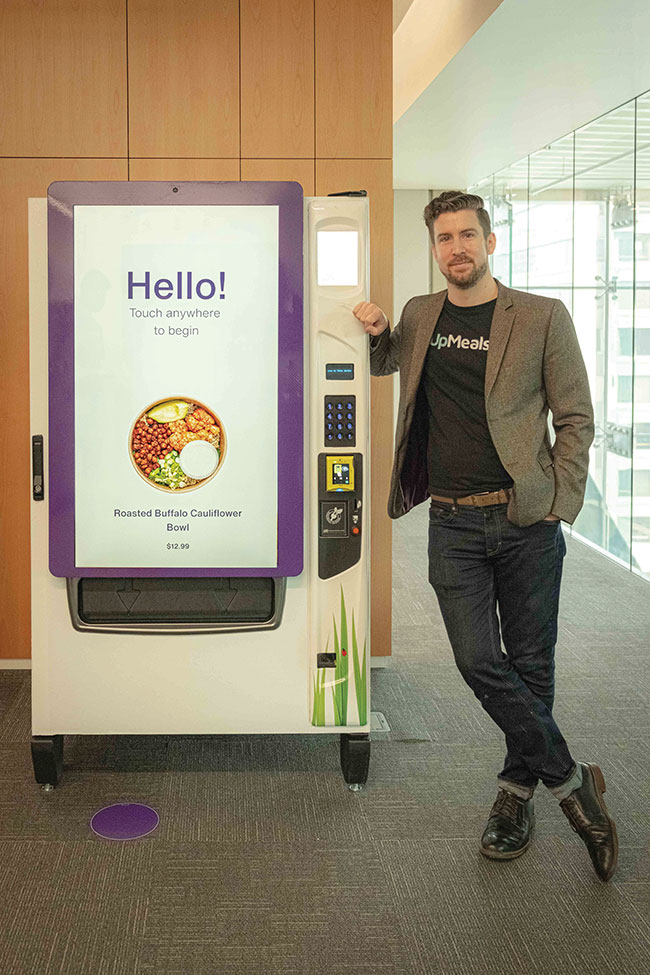
Pandemic-proof catering
April 21, 2021
By Dominic Messier
Chef makes gourmet meals accessible through automation
 Munro, CEO and Co-Founder, is an experienced chef and caterer who saw the need for an accessible, branded meal service solution.
Munro, CEO and Co-Founder, is an experienced chef and caterer who saw the need for an accessible, branded meal service solution. Chef Drew Munro and Brad Pommen, the founder of SMRT1 were thinking of collaborating long before the Coronavirus hit North America. Pommen designed the SMRT1 kiosks with touchless interfaces and Chef Munro is the founder of UpMeals. The two saw an opportunity in busy office settings, for employers looking to provide meals as a perk, and as part of a corporate wellness program.
Chef Munro spoke of the inspiration, “I had a master plan: take a ‘normal job’ in an office, save up some money and eventually go to Europe to work in Michelin starred restaurants, come back home, and open up a restaurant here. You know, in that experience, that I had working at that office environment, that’s actually where I got the idea to start this venture, because there was such a demand. So I started an office lunch catering service there at the office where I was working, which then became quite busy and quite successful. And that spawned me with this new entrepreneurial spark to create this catering company.”
A part of the appeal was the space and cost-savings advantages of a kiosk compared to catering or full cafeteria services: Providing a way to keep staff and employees safe and healthy was another. Pommen saw how healthy food kiosks already had a foothold in Fresh, Vancouver’s version of “Whole Foods Market.”
“UpMeals partnered with a number of different locations. That’s a place to get not only the sandwiches, but also offer other marketing and advertising for specialty products. But then, Upmeals are also servicing the offices of software companies where there’s 100 employees. This is a perk of three meals a day that they supply for corporations.”
With many companies making their offices safe for working, through measures like social distancing or providing touchless vending services, cafeterias may be phased out. One option to provide the safe and nutritious perk of breakfast, lunch and supper is through touchless vending instead of investing in a cafeteria. Challenges like dietary restrictions and employee attendances are also a part of the machines’ programming.
UpMeals has also thought of ways their service could be accessed without waste or having someone take advantage of the meal plan. “There’s a number of different ways that this system can be configured; in scenarios where it is just about sheer numbers so that they know they needed to order 60 meals today. And based on you attendance rate at the office, they should have 70 per cent available for tomorrow,” explained Pommen. “Those would be the type of scenario where they might have ID cards. They could use facial recognition technology. A lot of these things come from what the customer might already be comfortable with. So, if it’s just using their cell phone as an identifier, or if they have an employee card, those can all be tied in to identify them and restrict usage.”
Munro was impressed with how the SMRT1 technology can offer everything from food safety to office help. “Our goal is that there is never an overlap and that fresh products are constantly being stocked in the machine before everything has the risk of expiring. And the other really cool level of functionality is that with Brad’s technology, what he’s built in conjunction with us, is that as soon as our products are stocked into a machine, there’s an automatic timestamp that will start counting down right from that expiration date of that valid one. This also help facilitate our donation program – any meals that are not sold within their freshness time frame can be donated to local charities that distribute meals to the homeless, like the Vancouver Food Runners program.”
The collaboration began roughly seven months ago, but it originally began in the fall of 2019, when Pommen contacted Chef Drew Munro. Both saw how small restaurants, cafeterias or diners were struggling to find a space due to the price of real estate. Neither of them saw the pandemic coming, but the new COVID-19 capacity and space restrictions has opened up a new opportunity for UpMeals.
“I heard a statistic that 25,000 restaurants have closed due to COVID across Canada, and that means there’s a lot of commercial real estate space that will not be filled by Restaurants needs in the next couple of years,” said Pommen. “Because of hesitancy to either reopen, or associated costs, I think it’s going to drive up the commercial real estate for ghost kitchens and those types of services… I think [the pandemic] is going to drive up the demand for our type of product. We’re able to tap into the standard vending machine, we can use a locker, or we can use pretty much any new delivery mechanism on the market as part of our offering. The hardware is no longer the restriction.”
Dominic Messier is a Quebec-born, bilingual writer who loves to explore the latest in food trends and pop culture. He writes about film and television for www.skipitorloveit.com .
Print this page
Leave a Reply